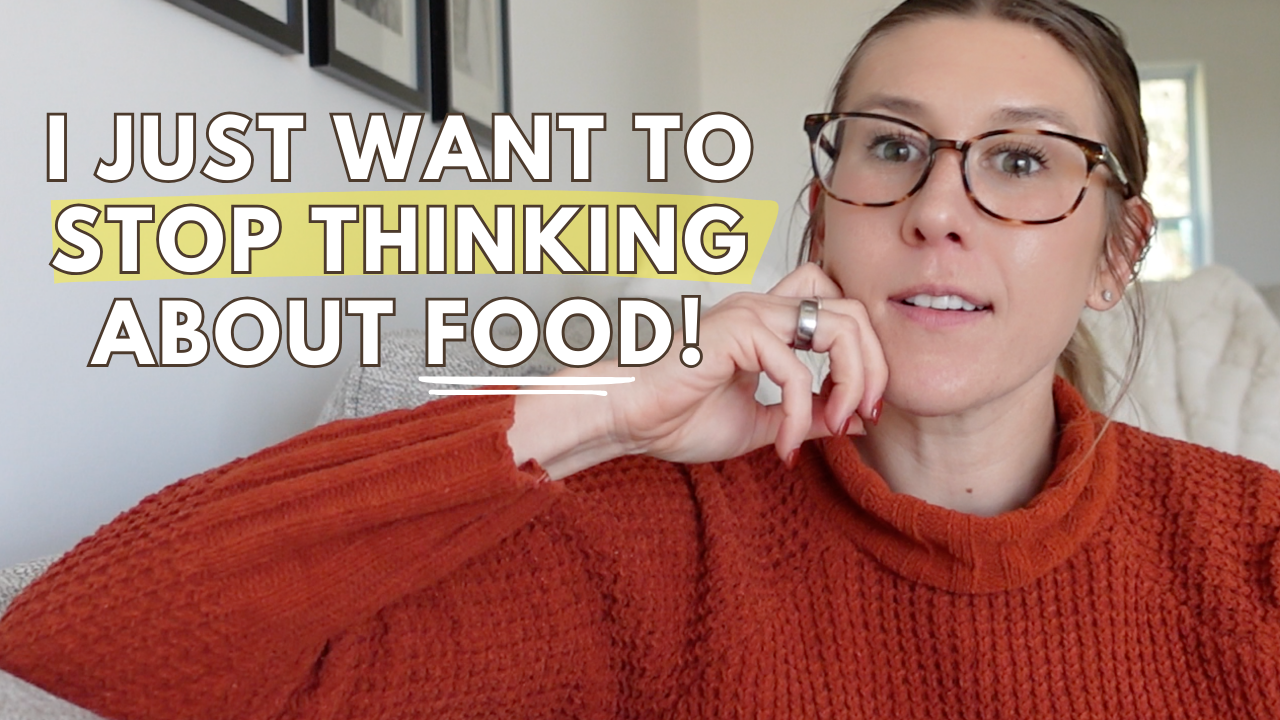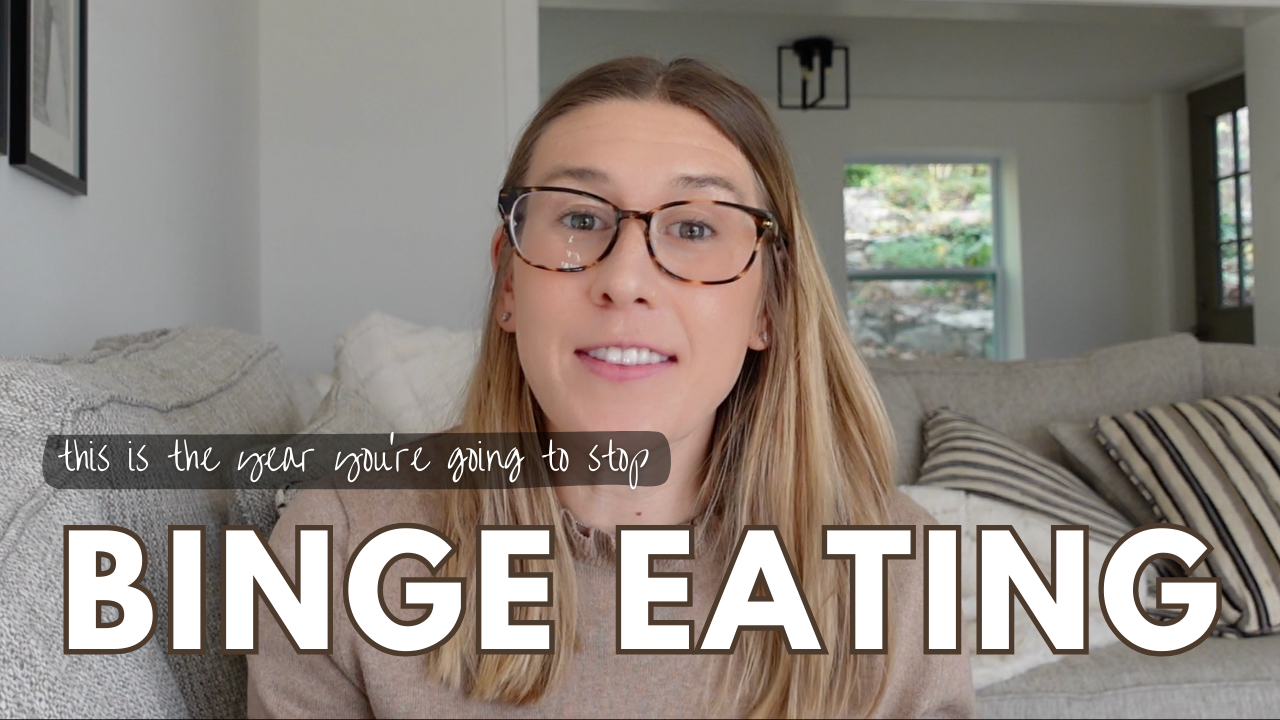Bouncing Back After a Binge: 5 Gentle Steps to Recovery
September 26, 2022

Hey There, I'm Ryann Nicole.
I’m a recovered binge eater who changed the story from something that happened to me to something that happened for me. Now, I’m a licensed therapist teaching you to do the same.
My mission? To help you ditch food stress and live your life with mental peace and freedom every single day!
I totally get those moments when you’re coming to your senses after a binge, and it hits you – the tummy ache, the shame, and all those mixed-up emotions. The big question pops up: “What now?”
5 Things to Instantly Do to Feel Better
It’s a real challenge not to get caught up in self-destructive thoughts and actions. But here’s the deal – if those old ways had worked, you’d be all sorted by now, right? So, what if we tried a new approach? If you’re wondering, “What should I do after a binge?” Here’s a kinder way to handle it:
1) Give Yourself Some Space
Wherever the binge went down, step away from that spot. If it happened in your car, go inside. Kitchen? Head to your room. Changing your surroundings can shift your mood and help with the healing, rather than being hard on yourself.
2) Chill Out
Emotions run wild after a binge. So, stop and take a breather. You can do this by letting a few tears flow, trying some relaxing breathing exercises, reaching out to a friend or loved one, closing your eyes and counting down from 10, or cuddling with a furry friend. Instead of bottling up your feelings or trying to run from them, let them flow through you while you find some inner calm.
3) Be Kind to Yourself
Picture a kid coming to you, saying they’ve overeaten and their tummy hurts. How would you comfort them? Treat yourself with the same compassion. Get a glass of water, change into comfy clothes, gently rub your belly, or even take a leisurely walk. Think about how you’d comfort a child with a sore tummy, and apply that same care to yourself.
4) Flip Your Thinking
After a binge, it’s easy to get stuck in a negative thought cycle, but that doesn’t do you any favors. It just piles on more shame, guilt, and emotional pain. You might not have control over those automatic negative thoughts, but you do have a say in whether you entertain them. Instead of getting caught up in those thoughts, try some positive reframing:
- “Every binge is a chance for me to learn something new. It’s not a failure; it’s part of my journey to recovery.”
- “Beating myself up after a binge hasn’t worked before, so today, I choose self-compassion.”
- “A binge means I have unmet needs, not that I lack control or I’m a failure. I’m going to prioritize self-care to address those needs.”
5) Reflect on What Went Down
After a binge, it’s crucial to reflect because binges are often a reaction, not a choice. Reflecting can help you uncover those unmet needs that trigger binging.
Recovering from binge eating takes time. Instead of seeing binges as failures, look at them as opportunities to learn and grow on your journey to healing. Remember, it’s absolutely okay to stumble along the way; what counts most is how you guide yourself back with love and care.
In the rollercoaster of recovery, remember that it’s the journey itself that matters most. So, let’s embark on this journey of self-compassion, growth, and healing after a binge. You’ve got this!
Keep Reading About Binge Eating:
- How Your Thoughts Can Trigger Binges
- Binge every time you’re alone? This is why!
- 5 things I (Ryann) had to do to STOP binge eating.
Must Read Books To Improve Your Relationship With Food
Just so you know, I do review everything I recommend. When you buy through links on this page, we may earn a commission.
Intuitive Eating by Elise Resch and Evelyn Tribole
When it was first published, Intuitive Eating was revolutionary in its anti-dieting approach. The authors, both prominent health professionals in the field of nutrition and eating disorders, urge readers to embrace the goal of developing body positivity and reconnecting with one’s internal wisdom about eating―to unlearn everything they were taught about calorie-counting and other aspects of diet culture and to learn about the harm of weight stigma.
Health At Every Size by Lindo Bacon
Fat isn’t the problem. Dieting is the problem. A society that rejects anyone whose body shape or size doesn’t match an impossible ideal is the problem. A medical establishment that equates “thin” with “healthy” is the problem. The solution? Health at Every Size. Tune in to your body’s expert guidance. Find the joy in movement. Eat what you want, when you want, choosing pleasurable foods that help you to feel good. You too can feel great in your body right now—and Health at Every Size will show you how.
Anti-Diet by Christy Harrison
In Anti-Diet, Christy Harrison takes on diet culture and the multi-billion-dollar industries that profit from it, exposing all the ways it robs people of their time, money, health, and happiness. It will turn what you think you know about health and wellness upside down, as Harrison explores the history of diet culture, how it’s infiltrated the health and wellness world, how to recognize it in all its sneaky forms, and how letting go of efforts to lose weight or eat “perfectly” actually helps to improve people’s health—no matter their size. Drawing on scientific research, personal experience, and stories from patients and colleagues, Anti-Diet provides a radical alternative to diet culture, and helps readers reclaim their bodies, minds, and lives so they can focus on the things that truly matter.
Just Eat It by Laura Thomas
With a perfect blend of scientific expertise and relatable anecdotes, the author dismantles societal myths around food and body image. Through practical advice, self-reflection exercises, and a touch of humor, Thomas equips readers with the tools to break free from the cycle of diet culture, promoting self-love and nourishment. This book is an essential companion for anyone seeking to redefine their approach to food, fostering a positive and sustainable lifestyle.
check out the pod
Ways I Can Support You
01 Coaching
Intimate group coaching to break free from binge eating
02 podcast
Real talk on food, mindset shifts, motherhood, and finding peace.
03 support group
A safe space to connect with others on the same journey.
04 free coaching
Have real conversations and hear others share their struggles.
Ryann Nicole
Licensed Therapist, Certified Nutritionist, and Virtual Wellness Coach
Ryann is a licensed therapist and virtual wellness coach who has assisted individuals worldwide in establishing a healthier relationship with food and their bodies.
Are You Ready to Heal Your Relationship With Food?
I understand—it can be overwhelming to figure out where to begin. Let's simplify things and have you start right here:
Why Am I Overeating?
First Steps To Stop Binge Eating
The Ryann Nicole
Podcast
FREE QUIZ
FREE GUIDE
Podcast
the food freedom lab podcast




